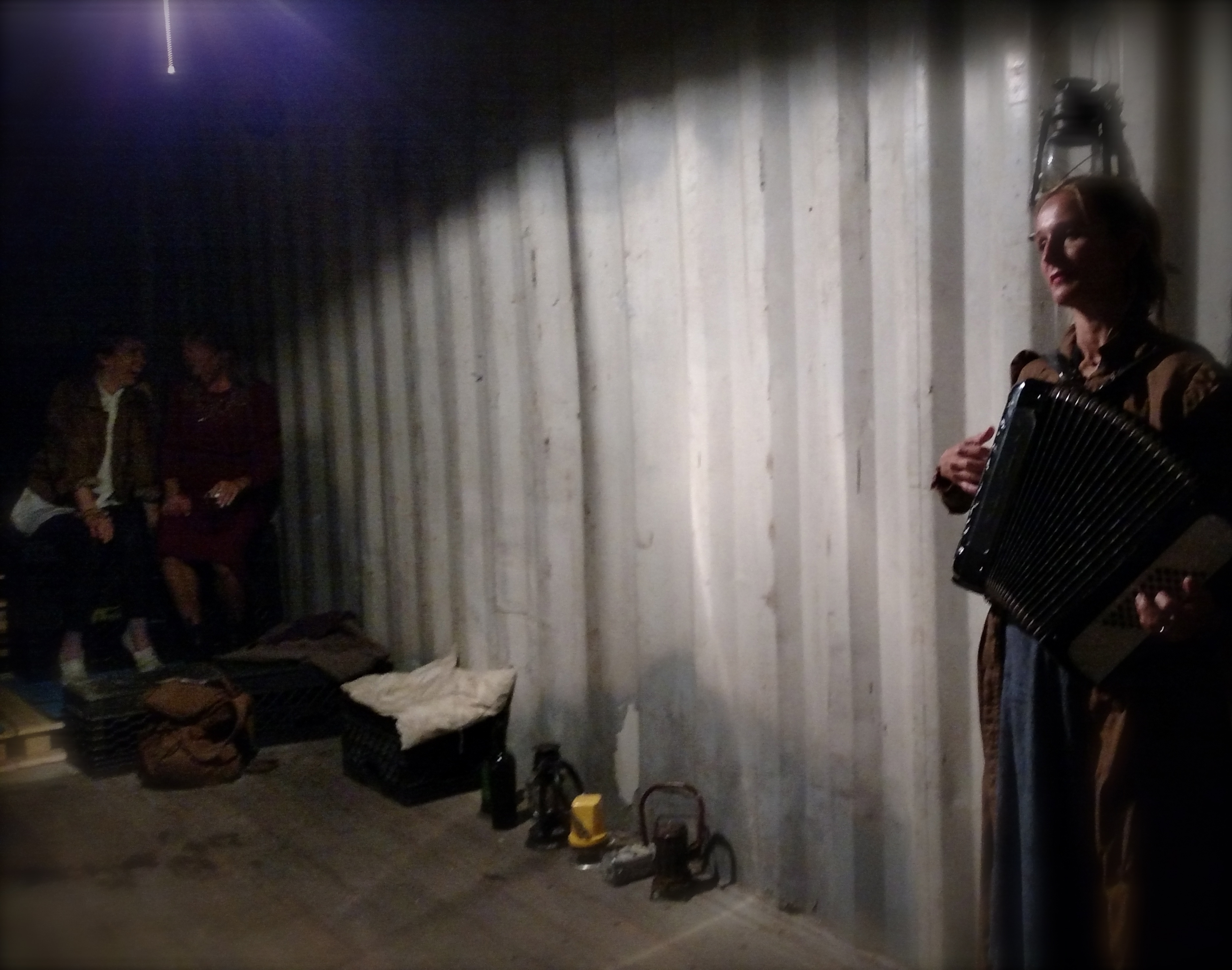The Theatre Group Dzieci is a Grotowski-inspired art and service collective that has lived for a decade with Shakespeare’s Scottish play and is only now presenting it, as MAKBET, in a theatrical run. They charge you nothing to see it, but pay the hat (you should) and accept from them a “piece of paper” that in other venues would be called a “program.” It will tell you that you have come to “a gypsy ritual Macbeth” and inform you of certain “rules of engagement.” There are five main actors, who know the play by heart, and may, within certain parameters, “take,” “embrace” or “refuse” any role. To take on or off a part is also to don or doff a piece of costume: a long red scarf for Lady Macbeth, a trench coat for the king (first Duncan, then Macbeth, the usurper, and Malcolm at the end). There is a cap for Banquo and a hat for Macbeth and for Macduff a kerchief, tied on the brow. You sit on milk crates to watch them and before they start you might be taught a song, by a gypsy, in a strange language, be offered odd things to nibble on or shots to refresh you, in the spirit, and the fact, of gifts. You are less performed for than hosted, a guest more than a patron. Some light pre-entertainment is undertaken: song, flamenco, ritual chant, accordion. You are sitting in a shipping container in a recycling yard in Bushwick called Sure We Can, where Macbeth may, finally, have found its ideal location.
It is the most claustrophobic of Shakespeare’s tragedies, its figures the most internally tormented. It is tight as a drum in structure, with a running time that makes time, itself, close in, like a single tomorrow, taut and inescapable, eternal as a dream. Memory fails if I have seen a realization of it that so captures its sense of confinement and moral entrapment as Dzieci’s does. The light is dim, except for a single scene, when a bright bulb, like the one Blanche drapes in Williams’ Streetcar, blinds the protagonist with a truth that need not be revealed, for the point is that he already knows it. For the rest, MAKBET is an act done in shadow, a blue wash from one side, like moonlight, a flashlight or two, some faint lamps. Sound carries clearly, even when whispered, in the container, and its metallic sides reverberate when struck, like a percussion instrument.
MAKBET, in this shadow world, is Shakespeare’s play not as plot but as substance. You don’t follow it so much as let it wash over you, don’t look at it so much as let it immerse you; it’s a current in which you are caught. Flashes of illumination come from nowhere, like fins from the deep. Part of its substance is its familiarity as a story known, and the tale is less caught in its every detail than sensed, a thing dark and chill in the night, held out to you, oddly enough, as an offering, an action of caritas. The actors give themselves up, as containers, through which the play, with all its malevolence, courses. Its flow may be blocked or diverted, but is too powerful to be held for long; its tributaries enter one player and then another; they may be murderers one moment and victims the next; men and then women; the dead or the living; boy into man. They hold power over and yet empower each other, pour identities into their comrades, and suck them out again, power as theme and desire, embodied. It is as though Macbeth and Macduff, in their final struggle, hold between them a substance yet ungrasped, its power untapped: the truth that Macduff was not, in fact, of woman born, and so Macbeth, the killer king, not immune to his revenge. I say “his” and “king,” but on the night I was there both of the actors in this memorable agon were women.
Megan Bones, Yvonne Brecht, Ryan Castala, Jesse Hathaway and Matt Mitler (also the director) are the core players. Felicity Doyle, Thea Garlid, Golan, Su Hendrickson and Polina complete the troupe, whose skills are musical as well as thespian. Their voices in the choral interludes, directed by John Norman, are spell casting, and Karen Hatt, as costumer, accessorized the ensemble with its talismanic caps and scarves. There is something deadly serious about all of this, but also a certain wryness and good humor in its gypsy framing. This is not a Macbeth that leaves you thinking that human nature is irredeemable, but a cleansing ceremony, cathartic in the ancient sense, that does the opposite, dramatic substance as an agent of purification.
Click on Sure We Can or Theatre Group Dzieci for additional information.
